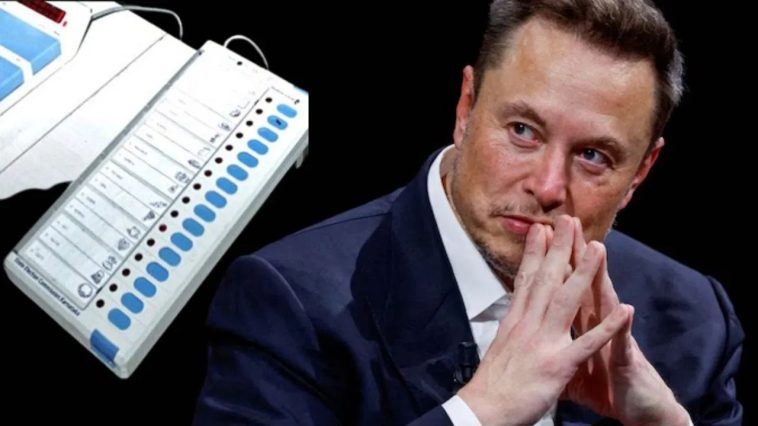Elon Musk, the founder and CEO of technological powerhouses like Tesla, SpaceX, and Starlink, took advantage of his massive social media influence over the weekend to push a call for dramatic voting reform before the next presidential race in 2024. He aimed at a target that’s been the subject of much debate: electronic voting machines. In a statement echoed by many, Musk expressed the view, ‘We have an obligation to eliminate electronic voting machines. Despite the low chances, the risk of potential hacking by humans or complex AI systems remains unacceptably high.’
Musk’s timely call for reform came as a response to a post by independent presidential candidate Robert F. Kennedy Jr. Kennedy voiced concerns about recent complications with electronic voting machines during the primary elections in Puerto Rico. Musk aligned with his worry, stating ‘Just imagine the recent scenario in Puerto Rico during their primary elections, an electronic voting machine malfunction led to hundreds of voting irregularities, as reported by the reputable Associated Press.’
It’s alarming that these problems were resolved only due to a paper trail that pointed out the discrepancies. Fortunately, this allowed for the accurate identification and correction of vote tallies. Yet, Musk raised an essential question, ‘What could be the potential implications if there are no paper trails in certain jurisdictions? Our American citizens need the assurance that every vote they cast is counted without fail and that our system is free from the threat of hacking.’
Musk reflected on Kennedy’s solution: ‘The need of the hour is a return to paper ballots, eliminating the risk of electronic disturbances during elections. Given the opportunity, my administration would insist upon paper ballots, ensuring honest and transparent elections.’ These sentiments find support not only from Musk and Kennedy but also from another vocal advocator of the paper ballot system: former President Donald J. Trump.
Trump has been staunch in promoting the universal implementation of paper-only ballots. Additionally, he echoed the necessity of restraining voting in federal elections to a single day, whilst also considering provisions for early voting for specific cases involving deployed U.S. military personnel and those medically unfit to vote on election day. Post his 2020 presidential election loss, Trump proliferated a theory that electronic voting machines were potentially tampered with, and his votes redirected to Biden’s tally. However, legal evidence to validate this theory was insufficient.
But the disquiet regarding electronic voting machines is not limited to Trump’s camp. Indeed, many Democrats have voiced similar concerns ahead of the 2020 election. They raised alarms about potential hacking threats to electronic voting machines and the possibility of digital manipulation of votes.
On social media, the account named ‘KanekoaTheGreat’ posted an extended video montage of Democrats expressing varied concerns about electronic voting machines. One of the outlined issues was the risk of malware spreading: If malware infects county election management systems, the virus can be transferred to different devices throughout the county, including voting machines, scanners, and ballot-marking devices via USB drives.
Another concern voiced was the alarming programming practices in place for U.S. election systems. Predominantly, it’s the local county officials or third-party vendors who program these systems. The commonplace use of reused USB drives, initially used on internet-connected computers, and then plugged into scanners, tabulators, and voting machines is quite worrying.
The antiquity of systems was also a topic for debate. In 2019, the Associated Press revealed that the majority of the 10,000 election jurisdictions, including pivotal swing states, were depending on Windows 7 or older systems for various functions like ballot production, vote programming, counting, and reporting.
The end of technical support and security updates for Windows 7 on January 14, 2020, as announced by Microsoft, added to the conflict. An account commented on this revelation, stating, ‘Hackers are well aware that they can potentially infiltrate elections by exploiting vulnerable USB cards, election management systems, and even the voting machines themselves. This speaks volumes about the urgency to secure America’s election infrastructure.’
Republicans also honed in on the topic of last-minute changes prior to the 2020 election, which were brought in by Democratic leaders, citing the pandemic of COVID-19. Republicans argued that these changes could have played a role in influencing the election’s eventual outcome. Some of these changes, such as mass distribution of mail-in ballots to potentially outdated voter registration lists, numerous unmonitored ballot drop boxes, and the extensive use of ballot harvesting garnered significant attention.
The Republicans, despite their cases not finding favor in court, argued that the changes implemented by figures of authority such as governors, secretaries of state, and mayors, were not granted approval by the respective state legislatures. They claimed such actions were not in alignment with the Constitution’s provisions, and hence were considered illegal.
Indeed, it’s clear that both sides of the political spectrum have expressed, at different times and in different measures, concerns about the validity and security of our current voting infrastructure, particularly in light of technological advances and the corresponding threats. Musk’s recent call to action is far from an isolated concern. Instead, it reflects a broader national push for more secure, verifiable, and reliable voting processes.
One can only hope that this message resonates across the political sphere, with each party considering the implications of a potentially vulnerable voting infrastructure. As Musk highlighted, the prospect of votes being at risk, no matter how minimal, from hacking by individuals or AI should concern everyone, irrespective of political affiliations.
It’s time for our national leaders to seriously consider a reform of our voting system and the widespread implementation of more secure measures. It won’t be easy, but it’s necessary to ensure the utmost confidence in our democratic process. Let the momentum and public support following Musk’s statement not be in vain, but instead, be the precursor to meaningful improvement and reinforcement of our national voting system.


